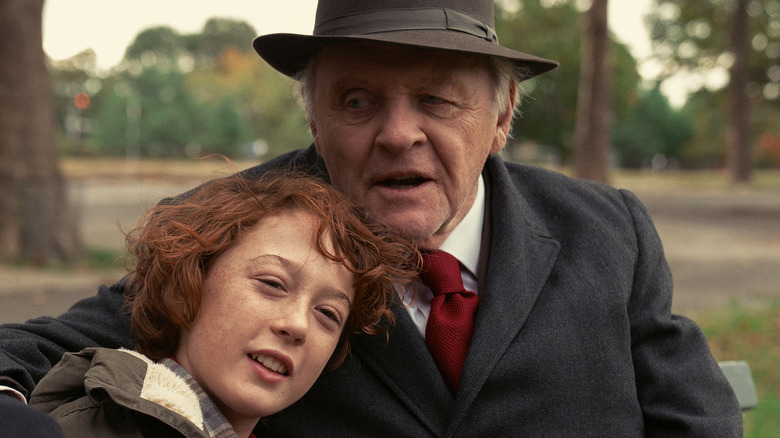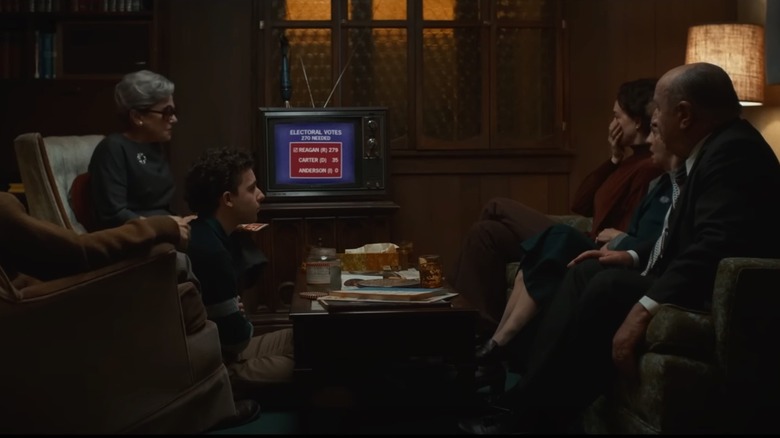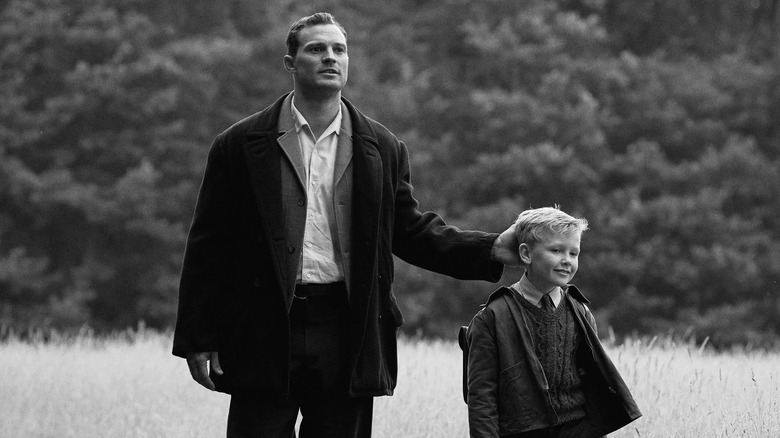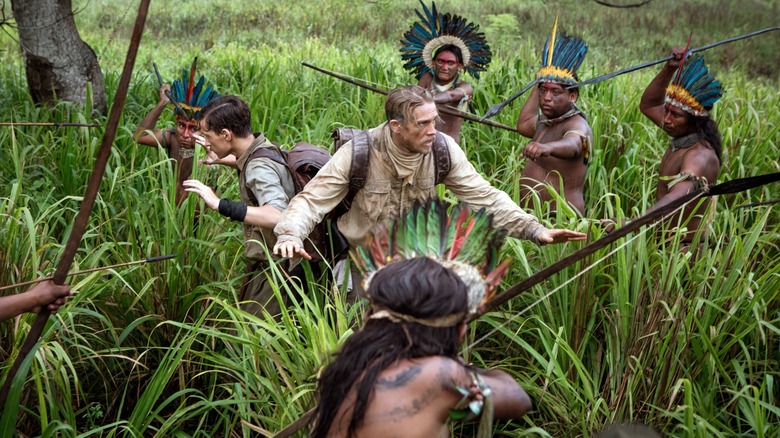There's A Dark Side To The Current Trend Of Semi-Autobiographical Movies
James Gray's "Armageddon Time" is the closest thing to stepping inside a director's memory. It's so authentic that the creative team used Gray's father's photo collection to build a near-identical replica of his family home on set — matching the wallpaper, paneling, and posters on his bedroom wall. If Paul Graff (Banks Repeta), standing in for a young Gray, was not made out to be a pretty terrible person, it might be easy to call the whole exercise self-indulgent, or at least an expensive form of therapy. But we also shouldn't single out Gray, as he's not the first director in recent years to bring their childhoods to life on the big screen.
The semi-autobiographical film as a genre is far from new, with Cameron Crowe's "Almost Famous" (2000) and George Lucas' "American Graffiti" (1973) being classic examples. The pace at which these types of films are releasing, however, does seem to be increasing as of late. Just over the past year, we've seen a steady drip of films inspired by directors' personal lives. It started with Kenneth Branagh's "Belfast" and Paul Thomas Anderson's "Licorice Pizza" last November, both shot entirely during the pandemic, which were then followed in March by Richard Linklater's rotoscoped (but not animated by Academy standards) "Apollo 10 1/2" — coincidentally, the only coming of age story this year with more references to NASA than Gray's film. "Armageddon Time" is simply the latest in the trend, soon to be joined by Steven Spielberg's "The Fabelmans."
While the scope of these films is somewhat narrow (they're all based on the lives of white men), they have proven to be astonishingly diverse in their styles and settings. Yet it does remain odd they are arriving all at once. As the newest contributor to the pool, Gray has thoughts about what's going on here.
Why now?
In his latest appearance on The Ringer's "The Big Picture" podcast, Gray debated with host Sean Fennessey over why this trend has accelerated. While Fennessey hypothesized that directors were making more personal films because they'd been spending time self-reflecting during pandemic lockdowns, Gray had a slightly different take:
"I wrote the script before the pandemic. So in my case, not really. But I think there is validity to what you're saying ... I think it has to do with ... I'm going to bring in something a little darker, which is, the movie business is in considerable peril on a variety of levels. And because of that, I know, in my case, and I know in my friends' cases, who have made personal films in this way, we may not get another shot. And that's, I think, really the bigger cause to be ... candid."
With the attention Gray gave to recreating his childhood home, it's easy to believe he made "Armageddon Time" as if he would never get another chance. This comes through in his writing process, as Gray spent many days sorting through family archives, reminiscing with his brother, and recollecting his own memories in conversations with his children. It was while living alone in Paris and directing an opera that he was "writing down different scenes ... and it was pretty quickly the story revealed itself."
Whether it was feeling lonely in Europe or existential fears for cinema's future, the notion of armageddon pervades every aspect of Paul's story in the form of his father (Jeremy Strong), transferring schools, losing his grandfather, betraying his friend Johnny (Jaylin Webb), and the looming threat of nuclear war. Gray's film proves the prescience of 1980 to today and justifies its timing — but other filmmakers had their own reasons for choosing now.
Testing Gray's theory
Gray's explanation that directors are making self-inspired films due to fears that it might be their last chance isn't universally true. Unlike Gray, some seem to have been influenced more directly by COVID-19. In a January 2022 Screen Daily interview, Kenneth Branagh indicated that the pandemic made for both a good and bad time to make "Belfast." He worried if a black-and-white arthouse film could get financial backing but also admitted:
"It became clear that any kind of art or entertainment that involved asking people to leave their homes and go and watch something was now under existential threat ... as an artist, your obligation had to be to try and go to the most personal place you could for the kind of story you needed to write ... you've got to feel yourself 100% behind it, because if you don't, why in this difficult time would you expect other people to come along?"
For Branagh, making a personal film was about connecting with others. For "The Fabelmans" director Steven Spielberg, the pandemic brought both creative drive and the time he needed to act on it. He recalled in a Hollywood Reporter interview in September:
"As the death toll mounted, we kept watching the reports of what was happening throughout the country and the world and I kept thinking, 'What is this going to mean for humanity? ... Well, if I'm going to tell a story that I've always wanted to tell about a coming-of-age in this very unique family with a very unique mother and father, this may be the best time, with all the time I had on my hands, to sit with [co-writer Tony Kushner] and ... write this on Zoom together because I didn't know where this was going. And I thought, 'This is something I got to get out of me now.'"
These statements poke holes in Gray's theory but may not put it to rest.
Box office soothsayer
In his conversation with Fennessey, Gray described the connection between the pandemic and the urgency that directors might be feeling in fairly depressing terms:
"I think you're not wrong about the pandemic, certainly forcing a kind of look inward. But one thing is connected to the other. The pandemic speeding up ... these darker clouds in the business. All of its contributed to the soup. So in that way, you're right. But I think it has to do with the fact that we're not sure this is going to last, this thing called cinema."
Gray is right to point out there may not be as many opportunities to make these types of films in the future, and it's hard to believe this wasn't a factor for Branagh and Spielberg too. Last holiday season's box office collapse of "West Side Story" ($74M against a $100m production budget) — a musical with household name recognition and directed by Steven Spielberg — was a reminder of the crisis faced by low- and mid-budget films made for specific audiences.
Earlier this year, Gray made some perceptive observations of the industry by noting the importance of theatrical to streaming engagement and the value of investing in low-budget arthouse films to keep the public in the habit of going to the movie. He also warned that not doing so would reduce the overall size of the box office. For Gray's part, he is certainly doing what he can to keep the theatrical business going. "The Lost City of Z" and "Ad Astra" were aspiring blockbusters with unremarkable box offices that probably performed decently on streaming, given Gray's comments.
With "Armageddon Time," Gray may have been less concerned with box office and more interested in memorializing his greatest mistakes, but at least he got his story out while he could.



